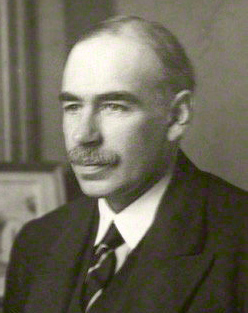John Maynard Keynes nejznámější citáty
1925 o omezené dostupnosti antikoncepce, nedostatku sexuální výchovy, zákonech o manželství a rozvodu,…
Originál: (en) …in all these matters the existing state of the law and of orthodoxy is still medieval – altogether out of touch with civilised opinion and civilised practices.
Zdroj: [Seven things you may not know about John Maynard Keynes, theguardian.com, 2015-03-05, 2015-10-30, http://www.theguardian.com/books/2015/mar/05/seven-things-john-maynard-keynes]
John Maynard Keynes: Citáty anglicky
“A study of the history of opinion is a necessary preliminary to the emancipation of the mind.”
Zdroj: Essays in Persuasion (1931), The End of Laissez-faire (1926), Ch. 1
Essays in Persuasion (1931), Social Consequences of Changes in The Value of Money (1923)
Zdroj: Essays In Biography (1933), Alfred Marshall, p. 223
“Nothing mattered except states of mind, chiefly our own.”
On the Cambridge Apostles of Cambridge University, in Essays in Biography (1933) Ch. 39; also later used in My Early Beliefs, a memoir he read to the Bloomsbury Group's Memoir Club in 1943.
Letter to Abba Lerner, 1942, On The Economics of Control
Essays in Persuasion (1931), Social Consequences of Changes in The Value of Money (1923)
Zdroj: Essays in Persuasion (1931), The End of Laissez-faire (1926), Ch. 3
As quoted in The Guardian (8 June 1983). p. 82
Attributed
Zdroj: Essays in Persuasion (1931), The End of Laissez-faire (1926), Ch. 2
Zdroj: How to Pay for the War (1940), Ch. 3 : Our Output Capacity and the National Income
Zdroj: How to Pay for the War (1940), Ch. 7 : The Release of Deferred Pay and a Capital Levy
Zdroj: How to Pay for the War (1940), Ch. 1 : The Character of the Problem
“The power to become habituated to his surroundings is a marked characteristic of mankind.”
Zdroj: The Economic Consequences of the Peace (1919), Chapter I, p. 3
Zdroj: How to Pay for the War (1940), Ch. 5 : A Plan for Deferred Pay, Family, Allowances and a Cheap Ration
Attributed by Sir George Schuster, Christianity and human relations in industry (1951), p. 109
Recent variant: Capitalism is the astounding belief that the most wickedest of men will do the most wickedest of things for the greatest good of everyone.
As quoted in Moving Forward: Programme for a Participatory Economy (2000) by Michael Albert, p. 128
Attributed
Zdroj: The Economic Consequences of the Peace (1919), Chapter VII, Section 1, p. 268
Zdroj: How to Pay for the War (1940), Ch. 1 : The Character of the Problem
On Georges Clemenceau, in Chapter III, p. 32
The Economic Consequences of the Peace (1919)
Notes after a meeting with Albert Einstein in 1926, The Collected Writings of John Maynard Keynes, Vol. 10, p. 383
Zdroj: Essays In Biography (1933), Mr. Lloyd George: A Fragment, p. 35
Zdroj: How to Pay for the War (1940), Ch. 1 : The Character of the Problem
published in Manchester Guardian (1922); in Collected Writings, Volume 17, p. 370
Zdroj: Essays In Biography (1933), Robert Malthus: The First of the Cambridge Economists, p. 148
“There were endless possibilities, not out of reach.”
Zdroj: Essays In Biography (1933), Alfred Marshall, p. 253
Zdroj: How to Pay for the War (1940), Ch. 3 : Our Output Capacity and the National Income
Zdroj: Essays In Biography (1933), Trotsky On England, p. 91
Zdroj: How to Pay for the War (1940), Ch. 1 : The Character of the Problem
A Revision of the Treaty (London: Macmillan, 1922), p. 186
Zdroj: The Economic Consequences of the Peace (1919), Chapter II, Section III, p. 19
“Successful investing is anticipating the anticipations of others.”
As quoted in Isms (2006) by Gregory Bergman, p. 105
Attributed
